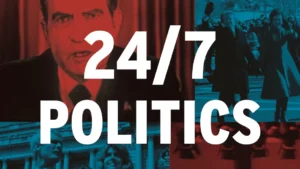
Every week I read a few outstanding articles but I have little or nothing to add. So I don’t post on them. But occasionally–and this is the first time–I will link to a few of the articles, quote a few segments, and maybe add my few thoughts.
Here are two excellent articles that I read this week.
Jesse Walker, “The Battlefields of Cable,” Reason, August 15, 2023.
Excerpt:
When C-SPAN’s cameras came to Congress in 1979, a wave of bloodless guerrilla maneuvers followed. Newt Gingrich, in those days a brash young Georgia congressman, led an insurgent cell of Republicans looking for ways to make the cameras work for them. One of their techniques was to deliver so-called “special order” speeches when the day’s business was over, which in addition to airing live on cable could be shared with local channels back home.
“These speeches frequently called out the Democratic opposition directly, daring them to respond,” the Purdue historian Kathryn Cramer Brownell writes in 24/7 Politics, a new history of cable news and the regulatory forces that shaped it. “But nobody did,” she adds, “because the legislative session had ended and everyone was gone.” Not that you could tell that by watching the show, since the camera’s eye stayed fixed on the person speaking.
And:
C-SPAN was the brainchild of Brian Lamb, who had worked for Whitehead at the Office of Telecommunications Policy, and it was sponsored by the cable industry, which hoped the channel would prove the medium’s value. Between its noncommercial ethos, its commitment to shining a light on the government’s inner workings, and its Warholian willingness to let a motionless camera run while nothing appeared to be happening, C-SPAN was one of the few national cable channels of the 1980s that resembled those old hippie dreams of what TV could be. But it was also a creature of the milieu it covered, a place where Bob Walkers and Tip O’Neills could jockey for position. If this was guerrilla television, it wasn’t the sort the New Left had imagined a decade before. It was a landscape for folks like Gingrich to conduct guerrilla warfare.
I’ve long been a fan of Brian Lamb. He was one of C-SPAN’s best interviewers of authors. His questions were not “gotcha” questions but, instead, “information-seeking” questions. But along the way, he occasionally got incredible admissions from authors who, because of his format, relaxed.
David J. Bier, “The Government Cheats, Loses, and Cheats Again to Make Immigrating Illegal,” Cato at Liberty, August 16, 2023.
Excerpt:
You traveled a thousand miles and spent thousands of dollars to reach the United States. The immigration rulebook (sometimes called “the law”) says that if you made it, you could apply for asylum and that officials “shall” process you. But guess what? In this game, the government cheats. It doesn’t want to process you. It wants you to go home. So when you reached the border in 2019, the officials at the legal crossing point wouldn’t process you. They stood in the middle of the bridge to block you.
You joined a lawsuit, and a court said, “Government, what you’re doing is illegal. Stop.” So in November 2021, the government issued a new policy that says, “You border guys, you can’t tell people to go away.” But it then promptly ignored that policy “because of COVID-19.” But that excuse ended in May 2023, so it reiterated the policy in a formal rulemaking. It couldn’t be clearer: “Our policy is to inspect and process all arriving noncitizens.” So you’d think you would get processed if you arrived at the border. But no, the government cheats.
Border officials are telling people that they must make appointments before they can request asylum, and they cap the number of appointments, even though the new rules make it perfectly clear an appointment will not be required. You can’t even schedule an appointment at all. Rather, you are put in a lottery to decide if you can even request an appointment. When Isabel “Doe” showed up unannounced at a legal crossing point with her bleeding husband whom a cartel shot, she was turned away. Her husband was then murdered in Mexico.
A number of my friends tell me that they are not against immigration but, rather, against illegal immigration. Here’s the test of their sincerity: Do they favor having the government obey its own law? If not, they are not in favor of legal immigration and are, in fact, in favor of government illegality.


READER COMMENTS
Richard W Fulmer
Aug 19 2023 at 1:04pm
I’m in favor of legal immigration and of government obeying its own laws. Everyone agrees that the immigration laws are broken. So, how do we fix them? We’ve got three options:
Open the borders,
Choose who comes in, or
Decide whom to keep out.
Let’s say that we go with option three and we decide that people with records for violent crimes (murder, rape, assault, arson), gang members, terrorists, slave traders, and people with communicable diseases will be denied entry.
Now we’ve got to have some way of keeping such people out. That means a wall – either physical or virtual. It also means a gate at which applicants for entry can be processed (e.g., identities verified, criminal records checked, health status determined). We don’t have infinite resources to perform such processing, so we must limit the flow rate.
So, any workable immigration laws must include practical ways to:
Keep people from crossing the border at will,
Limit the rate at which people cross the border, and
Vet those trying to come into the country.
David Henderson
Aug 19 2023 at 2:34pm
Good points.
But how about the narrower point that David Bier addresses: given what the law is currently, should the government officials be required to follow it?
Richard W Fulmer
Aug 19 2023 at 3:05pm
Yes
David Henderson
Aug 19 2023 at 4:21pm
Thanks.
steve
Aug 20 2023 at 6:55pm
Dont really get the wall thing. When I was in the military I climbed walls. Not that hard. Did it as part of training and also illegally when leaving base unauthorized. What you need is monitoring and/or a wall depending upon the environment. In densely occupied areas the combo of a wall and monitoring makes sense and we already have them in those areas. In sparsely populated areas you need monitoring. A wall doesnt provide very good ROI.
Steve
David Henderson
Aug 20 2023 at 7:20pm
You write:
Nor do I.
Dylan
Aug 19 2023 at 7:29pm
Given the status quo, it isn’t clear to me that we have a big problem with lots of people illegally crossing right now that would fall in these categories. But, let’s say we go with your proposal and let anyone legally come to the country that meets this greatly relaxed criteria. Certainly, it seems to me that this would greatly reduce the demand for crossing illegally, and make it easier to catch those that still attempt to do so?
john hare
Aug 19 2023 at 5:26pm
I am biased as I have a vested interest in immigrants. My wife is from Mexico and it is ridiculous to me the time it takes to get anything done. The last communication from them was that our marriage license looked altered and asked for the original, about eight months later. We’ve been working the situation since getting married in 2001.
I also have immigrants working for me that are working the process. It is disgusting to me that people are losing the prime working years of their lives waiting on bureaucratic procedures.
P.S. I’m not an open borders fan.
Andrea Mays
Aug 20 2023 at 1:41pm
Yes, our government should follow the rules it makes.
it seems to me one fix for the places (like New York City) overwhelmed by the # of migrants arriving would be to issue them (at the very least temporary) work permits. That would eliminate the bottleneck the state has for providing housing, meals and “services” for the new arrivals. The unemployment rates are verrrry low by historical standards. If ever such a fix were to be desirable and politically feasible, now would be the time.
I recognize that issuing work permits would encourage even more people to attempt to cross the border. It seems a good trade off to me— more people arriving, but people who have the chance to earn a living.
Mike Burnson
Aug 21 2023 at 5:30pm
David Bier’s comments are a gross, and I believe deliberate, misrepresentation of what the law states. The law is specifically with regard to ASYLUM, not all “immigrants”. The very point that someone has travelled 1,000 miles and spent thousands to arrive strongly points to NOT seeking asylum. That is, the person is simply an illegal immigrant.
Further, there are definitions under which a person can be said to seek asylum, generally to seek refuge from a bona fide threat of persecution. These definitions exclude the overwhelming majority of said “applicants”. The applicants are refugees, not immigrants. That they are guaranteed a hearing does NOT equal simply allowing them into the USA.
There are many other glaring flaws in his commentary.
Walter Boggs
Aug 22 2023 at 4:17pm
Not sure I follow your logic. The circumstance of being pursued by drug gangs and left unprotected by a corrupt government could very well motivate people to travel thousands of miles and spend as much money as they could raise. A person who seeks asylum through US laws is, by definition, not an illegal immigrant – that person hasn’t done anything illegal and in fact has not even immigrated.
Comments are closed.